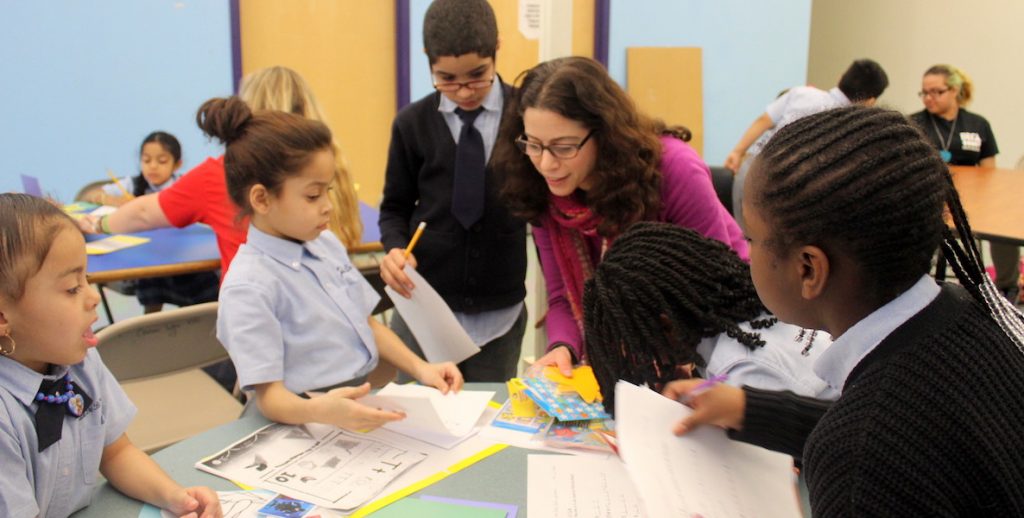Three years ago, when Providence Center was rethinking its after school program at Fairhill’s Julia de Burgos School, they turned to community leaders to determine what the children of the neighborhood needed. It wasn’t, as it turns out, just homework help, or recreation, or a safe space in the afternoon. It was help coping with the brutal circumstances of living in Philly’s highest-poverty and most murderous neighborhood.
So Providence Center—a 23-year old nonprofit in Fairhill—hired Christa Tinari’s 10-year-old PeacePraxis, which brings research-based social emotional learning (SEL) programs into schools around the country. Now, afternoons at Burgos center revolve around a curriculum that teaches children skills like resiliency, conflict resolution, empathy, and self-awareness. Those skills, in turn, have made the 40 elementary school children, and 10 teen advisors, into more attentive students who interact better with their peers and teachers in class—and beyond.
“It has been really transformational for our students,” says David Chiles, Executive Director of Providence Center. “We have seen improvements in every category of social and emotional learning, across the board.”
Tinari founded PeacePraxis over 10 years ago, and has since worked with thousands of teachers from hundreds of schools around the country, including around 50 public, charter and Catholic schools in Philadelphia. She is known for her anti-bullying programs, and is often called in to help facilitate meetings between parents, students and schools when dangerous situations come up. All of her techniques are research-based, tested either by her or by others in the field. Most of her work is with teachers, on specific practices they can bring in to their classroom to help their students with emotional social learning—including by using a “Feel & Deal Activity Deck” Tinari created with 32 cards depicting different emotions to help children express what they’re feeling, and identify other’s feelings. (She says her decks are used on six continents.)
Pennsylvania already has fairly detailed SEL standards for its schools; in fact, along with Illinois, it’s considered by some experts to be a leader in the field. “Pennsylvania and Illinois represent trailblazing states that have invested a great deal of energy, time, and infrastructure into the promotion of students’ SEL,” researchers wrote in a study for the national nonprofit Collaborative for Academic, Social and Emotional Learning (CASEL), which creates guides to SEL. “It is laudable that in both states SEL standards are included with all other subject areas in the listing of standards on state education websites. This communicates clearly that children’s SEL is highly valued along with traditional academic subjects.” Still, how intently those lessons are taught in Pennsylvania varies greatly by school, even sometimes by teacher.
Tinari started this work more than 20 years ago out of her own need: As an activities director at a local YMCA, she found herself at a loss as to how to help children who clearly had some issues that were causing them to act out. She started researching solutions, and discovered a whole field of study on the value of deliberate social and emotional learning. Today, she says, there is significantly more evidence-based research about what the best ways to teach SEL to children at all ages, much of it collected by CASEL.
“The goal is to equip every child with the social and emotional skills to be successful in schools and in life,” Tinari says.
At Providence Center, the after school curriculum touches on several aspects of SEL, focusing on helping kids to understand their emotions and how to cope with them; creatively solving problems; and self-control. One particular favorite of the children is what Tinari refers to as “Chill Skills”: When children are feeling anxious or angry, they’re encouraged to go to a box in the room filled with various stress-relievers, including squeezy balls, drawing and writing pads, books and cards with positive statements. The goal is for students to recognize their own needs, and figure out ways to self-soothe. “The staff teaches them the skills, but then they use them on their own,” Tinari says. “That makes them feel empowered.”
Tinari, along with those who work in her field, would like to see SEL techniques in every classroom, for every student—perhaps especially for those in places like Philadelphia, where children arrive at school with overwhelming issues. And the School District, under Superintendent Hite, has begun implementing SEL teaching in schools throughout the city, through various methods. But Tinari says it need not be something onerous, or time-consuming, like a separate sort of health class. It can be “small but powerful things throughout the day,” she says. Some teachers she knows do “feelings check-ins,” asking students to describe what they’re feeling in just a couple of words, or with a post-it note. In one class, a teacher has five different emotions on faces and students clip their names to the emotion that fits them after lunch.
“It can take six minutes,” she says. “But you can see how it changes the way the students interact with each other. They get better at expressing what they’re feeling; then we get better at managing their feelings. Kids are able to show concern and care for one another, which they wouldn’t be able to do if didn’t have that. And it gives them the opportunity to express empathy to each other.”
“We’re all working on these skills, I hope—they’re human skills,” Tinari says. “As we get older, our problems get more complex. We can’t address them the same way we did as children. But if we’re committed to the values of peace and compassion and understanding, of building community, we’ll work and get better at all of this.”

